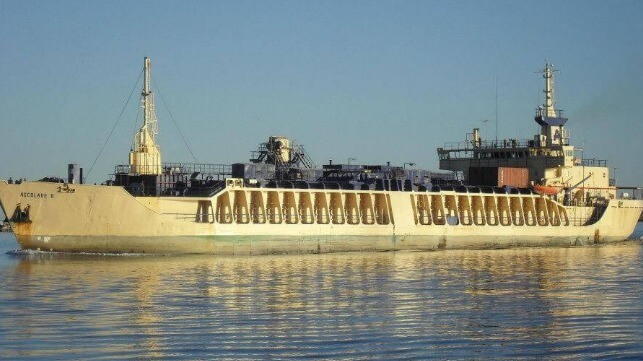CSL Orders World’s First Fully Electric Battery-Capable Self-Unloader

The world’s first fully electric, battery-capable self-unloading bulk carrier will begin construction in 2024 for delivery in 2026. The unique vessel is part of an ongoing effort by Canada’s CSL Group, an operator of dry bulk carriers, as it works to modernize and reduce emissions from its fleet.
The new vessel, which will be 11,000 dwt, will be outfitted with a hybrid diesel-electric propulsion system. CLS reports it will be combined with one of the most advanced battery installations to date on a bulk carrier. Approximately half of the vessel’s energy requirements will be provided by a combination of shore power and battery energy storage. There are also plans to install sufficient batteries in the future to allow fully electric operations.
“This groundbreaking vessel will initially run on a hybrid diesel and battery system, replacing 25 percent of diesel with electric power and lowering Scope 1 emissions by 40 percent compared to Accolade II,” explains Louis Martel, President and CEO of CLS. “By 2031, we aim to run the ship entirely on electric power, further reducing Scope 1 emissions to less than 10 percent.”
The vessel is being built as part of a 20-year strategic partnership with Adelaide Brighton Cement based in Australia. The custom-designed ship will replace Adbri’s Accolade II (8,140 dwt), a self-discharging bulk carrier built in Australia in 1982. The current vessel, which operates on MGO or gas, is based in Port Adelaide and managed by Inco Ships.
The new vessel will support the company’s limestone operations in South Australia with a focus on enhanced efficiency and environmental responsibility. The ship will carry up to 2.7 million tonnes of limestone per year, which represents a 35 percent increase over the existing vessel’s carrying capacity.
“Adbri is excited to have one of the world’s first 100 percent battery electric capable cargo vessels as our limestone carrier,” said Mark Irwin, Adbri's Chief Executive Officer. “The new vessel, owned and operated by CSL, will support Adbri to increase cement volumes at Birkenhead, while also supporting the production of lower carbon products such as EvoCem that uses limestone as a clinker substitute.”

that matters most
Get the latest maritime news delivered to your inbox daily.
The design of the new self-loading and self-discharging bulk carrier has been optimized to provide a fully integrated limestone supply chain for Adbri.
CSL is pursuing multiple steps toward reducing its emissions profile. The company is moving aggressively in the adoption of biofuels, starting with the fuel in 2019. During the 2023 season on the Great Lakes, they reported setting a new record using a total of 16,400 metric tonnes of B100 biodiesel in a single season. CSL Group and Algoma Central Corporation, earlier in 2023, placed a newbuild order with Jiangsu Yangzi-Mitsui Shipbuilding Co. to construct four new methanol-ready Kamsarmax-based (72,250 dwt) ocean belt self-unloading vessels.
